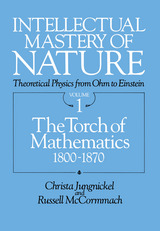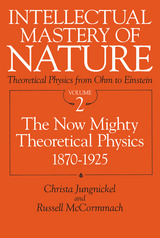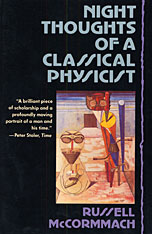
Volume 1 opens with an account of physics in Germany at the beginning of the nineteenth century and of German physicists' reception of foreign mathematical and experimental work. Jungnickel and McCormmach follow G. S. Ohm, Wilhelm Weber, Franz Neumann, and others as these scientists work out the new possibilities for physics, introduce student laboratories and instruction in mathematical physics, organize societies and journals, and establish and advance major theories of classical physics. Before the end of the nineteenth century, German physics and its offspring, theoretical physics, had acquired nearly their present organizational forms. The foundations of the classical picture of the physical world had been securely laid, preparing the way for the developments that are the subject of volume 2.

"A majestic study of a most important spoch of intellectual
history."—Brian Pippard, Times Literary Supplement
"The authors' use of archival sources hitherto almost
untouched gives their story a startling vividness. These volumes
are among the finest works produced by historians of physics."—Jed
Z. Buchwald, Isis
"The authors painstakingly reconstruct the minutiae of
laboratory budgets, instrument collections, and student numbers;
they disentangle the intrigues of faculty appointments and the
professional values those appointments reflected; they explore
collegial relationships among physicists; and they document the
unending campaign of scientists to wring further support for
physics from often reluctant ministries."—R. Steven Turner, Science
"Superbly written and exhaustively researched."—Peter Harman,
Nature

It is the end of an historical epoch, but to an old professor of physics, Victor Jakob, sitting in his unlighted study, eating dubious bread with jam made from turnips, it is the end of a way of thinking in his own subject. Younger men have challenged the classical world picture of physics and are looking forward to observational tests of Einstein’s new theory of relativity as well as the creation of a quantum mechanics of the atom. It is a time of both apprehension and hope.
In this remarkable book, the reader literally inhabits the mind of a scientist while Professor Jakob meditates on the discoveries of the past fifty years and reviews his own life and career—his scientific ambitions and his record of small successes. He recalls the great men who taught or inspired him: Helmholtz, Hertz, Maxwell, Planck, and above all Paul Drude, whose life and mind exemplified the classical virtues of proportion, harmony, and grace that Jakob reveres. In Drude’s shocking and unexpected suicide, we see reflected Jakob’s own bewilderment and loss of bearings as his once secure world comes to an end in the horrors of the war and in the cultural fragmentation wrought by twentieth-century modernism. His attempt to come to terms with himself, with his life in science, and with his spiritual legacy will affect deeply everyone who cares about the fragile structures of civilization that must fall before the onrush of progress.
READERS
Browse our collection.
PUBLISHERS
See BiblioVault's publisher services.
STUDENT SERVICES
Files for college accessibility offices.
UChicago Accessibility Resources
home | accessibility | search | about | contact us
BiblioVault ® 2001 - 2024
The University of Chicago Press









